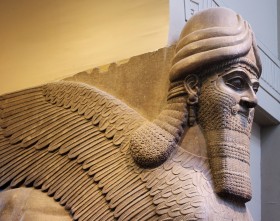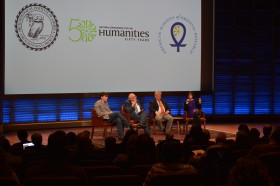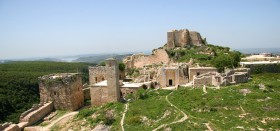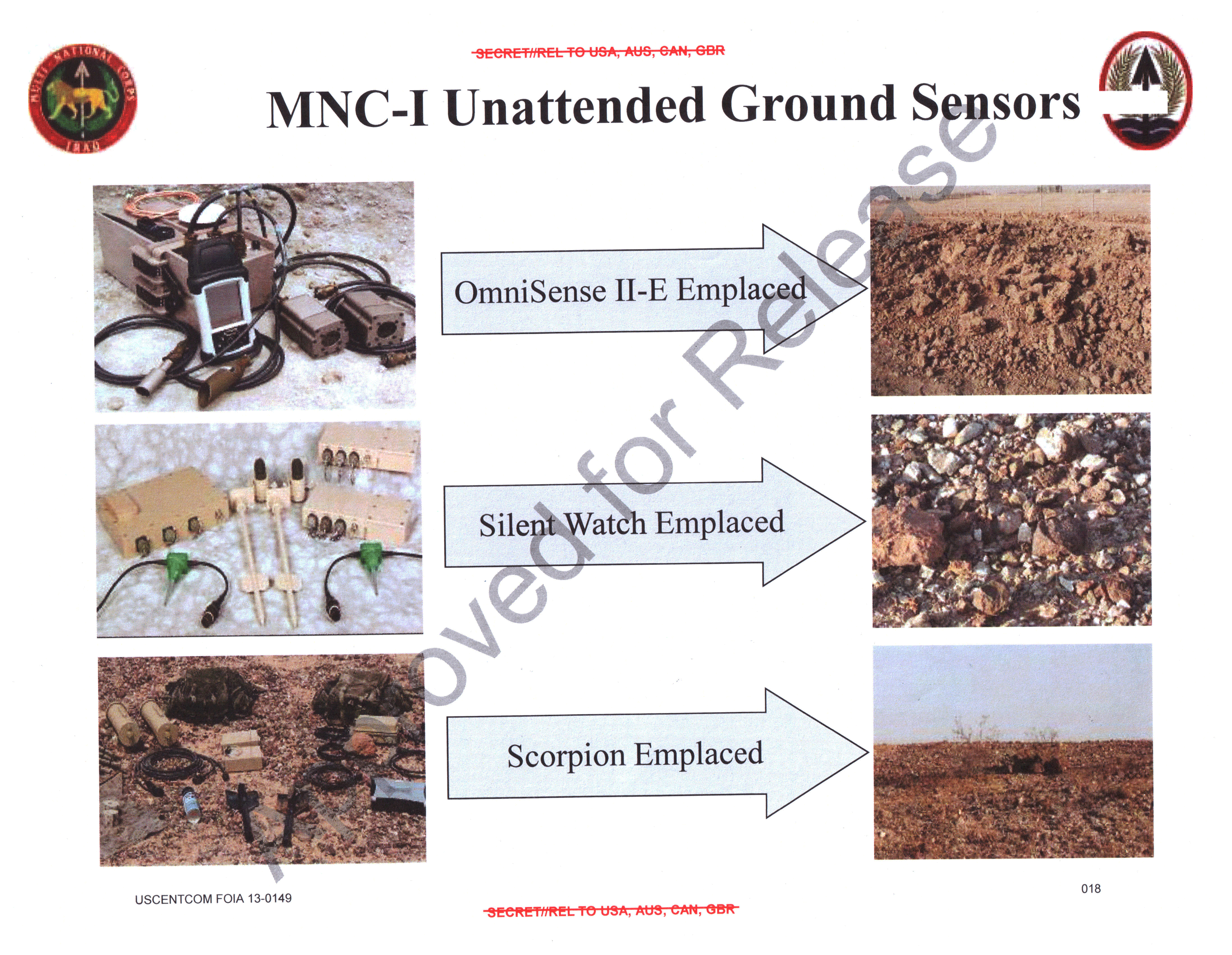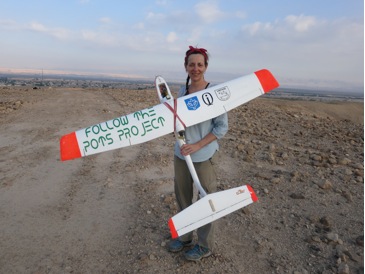Teaching Heritage in Classrooms
The first time I walked into my daughter’s playgroup, I saw a model of St. Peter’s Cathedral from Rome placed on the top shelf of the art/music classroom. Having walked around, I noticed the model of St. Basil’s […]
Twitter Recap: Protecting Our Shared Heritage in Syria— International Summit to Promote Collaboration
On Friday, December 11 there was a free and open to the public symposium at the National Geographic Society Grosvenor Auditorium in Washington, DC. The symposium […]
7 Things You Should Know About ASOR’s Syrian Heritage Initiative
Beginning August 4, the American Schools of Oriental Research entered into a cooperative agreement with the U.S. Department of State to monitor, document, and report on cultural heritage damage in Syria.
Heritage sites during Operation Iraqi Freedom Using Freedom of Information Act Requests
By: Levi Keach, University of Nevada, Las Vegas The research I presented at the recent ASOR Annual Meeting in Baltimore, “Heritage sites during Operation Iraqi Freedom Using Freedom of Information Act Requests,” is deeply entangled with my personal journey towards archaeology. While serving with the 1st Infantry Division in Baghdad during the Surge, I came to understand […]
This Is Our City
The Question of Cultural Ownership and Cultural Heritage on Madaba’s West Acropolis By: Debra Foran, Department of Archaeology and Classical Studies Wilfrid Laurier University The question of who owns the past is a difficult one to address. There are often multiple stakeholders and the notion of a site’s importance for a global cultural heritage must […]
Landscapes of the Dead
Landscapes of the Dead: Aerial and Pedestrian Site Monitoring at Fifa, an Early Bronze Age Cemetery on the Dead Sea Plain, Jordan By: Morag M. Kersel, Department of Anthropology, DePaul University The primary objective of the Landscapes of the Dead Research Project is to assess (through aerial photography and a pedestrian survey) the Early Bronze […]
Who Owns This Part of the Past? The Cultural Heritage of Tall al-`Umayri, Jordan in Jeopardy
By: Douglas R. Clark, Center for Near Eastern Archaeology, La Sierra University Is culturally significant land private or public property? What happens when a major, signature archaeological site is owned privately? Who owns this part of the past? How does one resolve competing claims of ownership and use? Numerous archaeological sites in Jordan are privately […]
Archaeology Weekly Roundup! 10-25-13
If you missed anything from the ASOR facebook or twitter pages this week, don’t worry. We’ve rounded up some of this week’s archaeology news into one convenient post. If we missed any major archaeological stories from this week, feel free to let us know in the comment section! The Home of the Last Neanderthals 250,000 […]
Archaeological Field Work in Egypt After the Revolution
By: James K. Hoffmeier, Trinity International University On January 25 the Egyptian revolution that toppled the thirty-year dictatorial reign of Hosni Mubarak began. On February 11th, Mubarak resigned. While the political news gripped much of the world, reports of some looting in the Cairo museum surprised everyone. Though limited in scope, security was quickly […]
A Toast to Our Fermented Past: Case Studies in the Experimental Archaeology of Alcoholic Beverages
EnglishEnglishFrenchPowered by TranslateBy: Kevin M. Cullen Archaeologists and historians are constantly in pursuit of the tangible human past, whether it is in the form of material culture or primary written sources. This direct evidence of the past can still leave us disconnected from the full context in which the technology or writings were employed. Therefore, […]
Archaeology in Lebanon Today: Its Politics and Its Problems
By: Hélène Sader Lebanon has a long and very rich past, but in spite of the country’s wealth of ancient settlements, compared to neighboring countries archaeological research is far behind. While in the last decades archaeological research has greatly enhanced our understanding of Syria’s, Jordan’s, and Palestine’s past, Lebanon appears to be lagging behind and […]
Ten Years after Iraq: Archaeology, Archaeologists, and U.S. Foreign Relations
By: Morag M. Kersel and Christina Luke Ten years ago, in April of, a coalition led by the United States invaded Iraq. This quickly toppled the Ba’athist regime of Saddam Hussein but also resulted in the loss of life, local unrest, displacement, and the ransacking of cultural institutions, archives, libraries, and the national museum […]
Archaeology after the Arab Spring
By: Jesse Casana The transformative political events in the Middle East over the past two years have had, among many other unexpected outcomes, profound effects on the direction of research in Near Eastern archaeology. War and civil unrest act as both a carrot and a stick, forcing the cessation of fieldwork in some areas, while […]
Archaeology and Cultural Heritage in Egypt after Mubarak
By: Greg Williams Egypt’s January 25th revolution was originally seen as part of the larger “Arab Spring” across the Middle East where old political regimes were overthrown by popular protests and replaced by representative democracies. But on January 28th, as chaos reigned in Cairo’s Tahrir Square, reports began circulating around the globe claiming that […]
ASOR and Archaeological Ethics
By: Lynn Swartz Dodd “There is a tendency at every important but difficult crossroad to pretend that it’s not really there.” —Bill McKibben What should American Schools of Oriental Research (ASOR) members do if new Dead Sea Scrolls are found? What if our country’s military actions increase uncontrolled looting of ancient sites? Or if war […]
Using Inscriptions from the Antiquities Market: Polarized Positions and Pragmatic Proposals
By: Christopher A. Rollston Archaeological sites in the Middle East have been ransacked, pillaged, and plundered for many decades. The motivations of the actual pillaging are normally economic: the pursuit of marketable artifacts. That is, the pillagers wish to find objects that can be sold to collectors. Of course, the motivations of the collectors who […]
Wil Gafney: History Channel’s Satan and President Obama
By: Wil Gafney, Associate Professor of Hebrew and Old Testament at The Lutheran Theological Seminary at Philadelphia. This entry is reblogged from Dr. Wil Gafney’s blog. You can find the original entry here and Dr. Gafney’s other posts on The Bible series here. Many viewers of the History Channel’s Bible mini-series saw and see a resemblance between the character […]
The Cultural Afterlife of Mosaics in Turkey
By: Laurent Dissard, University of Pennsylvania Sensational discoveries of mosaics periodically make the headlines of newspapers in Turkey. After being discovered, unearthed, cleaned, and removed, these ancient floors slowly make their way to museums or private collections. For this month’s ASOR Blog on the Archaeology of Anatolia, I wish to examine the curious afterlife of mosaics […]
Cultural Heritage Month Comes to an End
We have had a successful October here, with a great range of posts on cultural heritage projects, the idea of heritage itself, and current problems in the field. If you haven’t read them all already make sure you do. Check out the list of posts below with brief summaries of each. November 14-17 will be […]
The Terms of Heritage
By: Kathryn McDonnell Specialized terminology, such as stake holders, the “universal museum,” provenance, or even the phrases, “cultural property” or “cultural heritage,” is often used during discussions between law enforcement professionals, such as Homeland Security Investigations (HSI) in the US or the Carabinieri in Italy, diplomats (ICOMOS), lawyers, and scholars, including archaeologists. Although these terms […]
